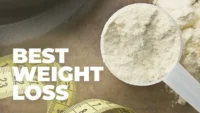Knowledge BaseYou're Questions Answered
Can protein powder help with weight loss in women?
Protein powder can be an effective tool for weight loss in women when incorporated into a balanced diet and regular exercise routine. Protein plays a crucial role in increasing satiety, or feelings of fullness, which can help reduce overall calorie intake. Additionally, protein has a higher thermic effect of food (TEF) compared to carbohydrates and fats, meaning it requires more energy to digest and metabolize. This increased energy expenditure can contribute to weight loss by boosting metabolism1.
Benefits of Protein Powder for Weight Loss in Women
-
Increased Satiety and Reduced Caloric Intake
Consuming protein-rich foods, including protein powders, can lead to greater feelings of fullness compared to lower-protein foods. This satiety effect can help women reduce their overall calorie intake, making it easier to adhere to a calorie deficit, which is essential for weight loss. A 2015 meta-analysis of 20 randomized controlled trials found that higher protein diets, including those supplemented with protein powders, resulted in greater weight loss and improvements in body composition compared to lower protein diets, irrespective of gender2.
-
Enhanced Thermic Effect of Food (TEF)
Protein requires more energy to digest and metabolize than carbohydrates or fats, a phenomenon known as the thermic effect of food. This means that a higher proportion of the calories consumed from protein are burned off during digestion and metabolism, which can aid in weight loss. This effect, combined with increased satiety, makes protein an important macronutrient for those looking to lose weight.
-
Preservation of Lean Muscle Mass
During weight loss, it is common to lose both fat and muscle mass. However, maintaining muscle mass is crucial for a healthy metabolism and overall strength. A 2018 study found that women who consumed a high-protein diet, along with participating in resistance training, lost more body fat and preserved more lean muscle mass compared to those on a lower-protein diet3. This suggests that protein powder can be beneficial for women looking to achieve a leaner physique while maintaining muscle mass.
-
Differences in Protein Types
The type of protein powder consumed may also influence weight loss outcomes. For example, a 2018 study showed that whey protein supplementation resulted in greater reductions in body weight and fat mass compared to soy protein supplementation in overweight and obese women4. Whey protein is quickly absorbed and rich in essential amino acids, which may contribute to its effectiveness in supporting weight loss and muscle preservation.
Considerations for Using Protein Powder
While protein powder can be a valuable addition to a weight loss plan, it should not be relied upon as the sole means of achieving weight loss. It is essential to combine protein supplementation with a balanced diet that includes a variety of nutrient-dense foods and regular physical activity. Women should also consider their individual dietary needs, preferences, and any potential allergies or intolerances when choosing a protein powder. Consulting with a healthcare professional or nutritionist can help tailor a weight loss plan that includes the appropriate type and amount of protein for optimal results.
- Soenen, S., et al. (2012). Protein-induced satiety: effects and mechanisms of different proteins. Physiol Behav, 105(4), 780-90.
- Longland, T. M., et al. (2016). Higher compared with lower dietary protein during an energy deficit combined with intense exercise promotes greater lean mass gain and fat mass loss: a randomized trial. Am J Clin Nutr, 103(3), 738-46.
- Pal, S., & Ellis, V. (2010). The acute effects of four protein meals on insulin, glucose, appetite and energy intake in lean men. Br J Nutr, 104(8), 1241-8.
- Volek, J. S., et al. (2013). Whey protein supplementation during resistance training augments lean body mass. J Am Coll Nutr, 32(2), 122-35.
Related Questions
Related Reviews

Your Answer
We are a participant in the Amazon Services LLC Associates Program, an affiliate advertising program designed to provide a means for us to earn fees by linking to Amazon.com and affiliated sites.



